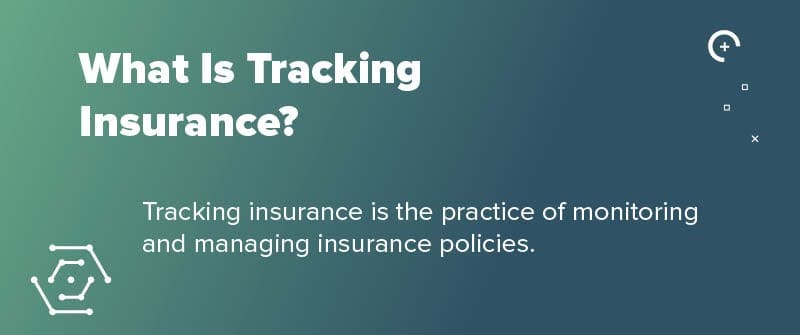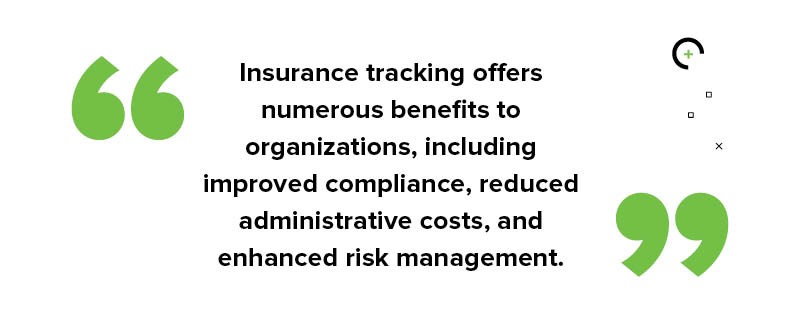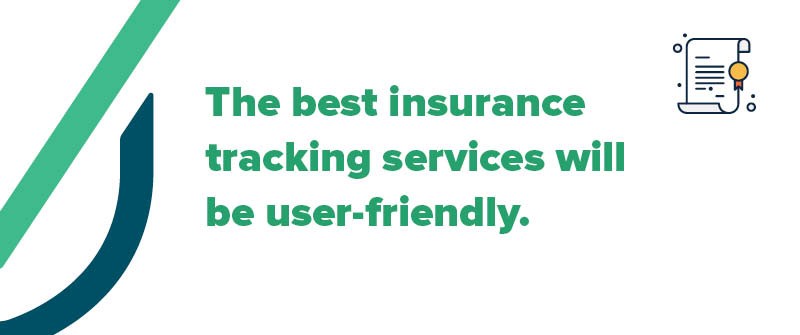
Managing insurance coverage is a daunting task for most individuals – and can pile up for businesses, too. This is especially true for those who hire and work with a high percentage of contracted or third-party workers.
Whether you’re a large corporation, a small business owner, or an individual policyholder, understanding the basics of insurance tracking can help you stay on top of your coverage and avoid potential risks.
In this article, we’ll explore the ins and outs of insurance tracking, the role of tracking devices in insurance, and how to find the best certificate of insurance services. Let’s get started.
What Is Tracking Insurance?
Tracking insurance is the practice of monitoring and managing insurance policies to make sure that they are active and meet the specific compliance requirements of a contract, business specification, or industry- or state-wide regulation.
Insurance professionals play a crucial role in navigating complex insurance documentation and compliance issues, enhancing the credibility and reliability of effective insurance tracking solutions.
The process of tracking insurance involves activities such as:
- Collecting insurance certificates from relevant third parties like contractors, vendors, suppliers, or other partners
- Verifying that third-party contractors have the necessary insurance policies, in the necessary amounts, in place
- Keeping track of policy renewals and changes for third parties over time
- Monitoring coverage to ensure protection throughout a project or contract’s timeline

Insurance tracking is important for several reasons, its primary purposes being to mitigate risk, protect against potential liabilities, and ensure that all parties involved in a project or business relationship are adequately insured. It also gives businesses the ability to proactively address potential coverage gaps before they lead to financial losses or legal issues. By tracking insurance, businesses can identify issues early and take corrective action to ensure continuous coverage.
Industries that commonly use insurance tracking include those where compliance and risk management are important or where third-party claims are likely. This especially means sectors like construction, healthcare, and logistics. In these industries, where many third-party vendors and contractors might be employed, it is common to rely on insurance tracking services to monitor the coverage status of various parties, ensuring that everyone is adhering to their industry regulations and meeting contractual obligations.
What Is Certificate of Insurance Tracking?
Insurance certificate tracking is a more specific and specialized kind of insurance tracking that focuses on monitoring one document in particular: the certificate of insurance, also known as a COI.
A COI is a document generated by an insurance provider that acts as evidence of someone’s current insurance coverage. It typically includes details such as the policyholder’s name, policy number, coverage limits, and effective dates, as well as information about the insurer and potentially about the requestor, who will become known as the certificate holder. Collecting, verifying, and storing COIs is the most common way to do third-party insurance verification and management.
How can you track insurance policies? COI management tracking software plays a crucial role in centralizing and managing these insurance certificates, offering benefits such as compliance management, risk identification, automated renewal tracking, and ease of access to essential insurance documents.
Insurance certificate tracking is a hugely important practice for any industry that relies heavily on third-party work, such as construction, real estate, healthcare, manufacturing, and transportation. For example, construction companies will very commonly require that all contractors on a project provide a valid COI before beginning work. This is so that the business is certain of a contractor’s protection in the case of a covered incident – ensuring that neither the company nor the contractor will be held personally financially liable.
Benefits of Insurance Tracking
Insurance tracking offers numerous benefits to organizations, including improved compliance, reduced administrative costs, and enhanced risk management. By implementing an insurance tracking system, businesses can ensure that they are maintaining compliance with regulatory requirements and industry standards. This can help to reduce the risk of fines, penalties, and reputational damage. Additionally, insurance tracking can help organizations reduce administrative costs by automating manual tasks and streamlining the insurance tracking process.

Insurance Tracking Solutions
Insurance tracking solutions are designed to help organizations manage their insurance documents and certificates of insurance (COIs) more efficiently. These COI management solutions typically include features such as automated tracking and reminders, customizable workflows and reporting, and user permissions and access control. By implementing an insurance tracking solution, businesses can improve their insurance compliance, reduce administrative costs, and enhance their risk management.
Key Features of Insurance Tracking Software
Automated Tracking and Reminders
Automated tracking and reminders are key features of insurance tracking software. These features allow businesses to automate the tracking of insurance documents and certificates of insurance (COIs) and to set reminders for upcoming renewals and expirations. This can help to ensure that organizations are maintaining compliance with regulatory requirements and industry standards.
Customizable Workflows and Reporting
Customizable workflows and reporting are also key features of insurance tracking software. These features allow businesses to create customized workflows and reports that meet their specific needs and requirements. This can help to improve insurance compliance, reduce administrative costs, and enhance risk management.
User Permissions and Access Control
User permissions and access control are important features of insurance tracking software. These features allow businesses to control who has access to their insurance documents and certificates of insurance (COIs) and to set permissions for different users. This can help to ensure that sensitive information is protected and that only authorized personnel have access to it.
Do Insurance Companies Use Tracking Devices?
A separate but related practice to tracking insurance policies and certificates is the use of tracking devices by insurance companies to monitor certain policyholder behaviors. These tools, often referred to as telematics devices, are used particularly in the auto industry to assess policyholder driving habits and use the information to calculate premiums.
There are several types of tracking devices used in insurance, including GPSs, mobile apps, and plug-in devices that connect to a vehicle’s onboard diagnostics (OBD) port. These devices are intended to collect data on a number of driving factors, such as speed, mileage, and braking patterns, all of which can be used to assess and build a risk profile associated with a policyholder. The data collected can also be used to offer personalized discounts or rewards to drivers deemed “safe.”
For insurance companies, these devices bring a few key benefits. It allows them to assess risk more accurately, segment their policyholders based on behaviors, better personalize service to them, and incentivize safer behavior. It also can lead to reduced claims costs overall.
For policyholders, some drivers could appreciate benefitting from the discounts earned from their low-risk driving habits. Others might have privacy concerns about this kind of tracking or suffer the consequences of increased premiums due to their unsafe practices.
Should I Let the Insurance Company Track My Driving?
These devices allow insurance companies to track how safely (or not) people operate their cars. Whether or not you allow an insurance company to track your driving is totally up to you and comes with both pros and cons.
For individuals who can demonstrate low-risk driving habits, it could be nice to be eligible for discounts on potentially hefty auto insurance premiums. Some insurance companies also offer usage-based insurance programs that reward drivers with lower rates based on their driving behavior. This can be helpful for drivers who consistently follow safe driving practices and may not be going very far.

However, there are also downsides to consider here. Many individuals have privacy concerns when it comes to having tracking devices collect data on them and their driving habits. Some drivers may feel uncomfortable or anxious with the idea of being constantly monitored. There is also the risk that the data could be used to increase premiums if the insurance company determines that a driver is engaging in behaviors that are risky or unsafe.
Ultimately, if you’re usually a safe driver and are fairly confident that the data collected from a tracking device will work in your favor, participating in a UBI or tracking program could lead to savings. However, if privacy is a major concern of yours or if you’re worried about the potential for increased premiums, it may not be worth participating in.
Why Is it Important to Track Certificates of Insurance?
Coming back to more business-specific use cases, let’s turn again to third-party insurance verification to truly understand the importance of insurance tracking.
Issuance services play a crucial role in this process, helping organizations manage risks effectively while providing competitive rates and quick turnaround times.
This process aims to do a few things for businesses. First, it helps them minimize risk and financial and legal liability by ensuring that all parties involved in a job are adequately protected. If not correctly insured, a third party’s liability can “trickle down” to the hiring party – meaning that you’ll pay the price for an unprotected worker you hire. Therefore, it’s in your best interest to do your due diligence and make sure they have the proper protection in place before they begin their assigned work.
Second, insurance certificate tracking helps keep projects adhered to their timelines by reducing the likelihood of delays related to claims and contractual disputes.
Finally, whether industry-wide regulations, state-wide regulations, or a list of specific asks from a hiring company to a third party insurance verification, ensuring coverage compliance for all parties will set business relationships up for safety and success. And on both the hiring and the contracting side, the more comfortable you are with COIs, the more professionally competent you’ll seem.
Finding the Best Insurance Tracking Solutions
When looking to find the best insurance tracking services, there are several criteria you can consider.
First, think about what you want these services to do for you. Generally, it’d be ideal to find a service with comprehensive coverage tracking and verification capabilities, including the ability to monitor policy renewals, verify insurance certificates, and ensure compliance with contractual requirements and industry regulations. Customer satisfaction should also be a key consideration, as it reflects the quality and reliability of the service.
Another factor to consider is how easy a platform is to use. The best insurance tracking services will be user-friendly. Robust platforms will also likely include features like automated alerts and real-time updates, making it easy to manage and monitor your insurance coverage. Additionally, look for platforms with data analytics features that allow you to monitor trends, track patterns, and identify potential risks in real-time or even proactively. Insurance experts often design these features to ensure they meet industry standards and client needs.
Finally, good software should be backed by a strong system of customer support. Look for a service that offers multiple support channels, such as phone, email, and live chat, as well as resources like FAQs and tutorials that can help you better understand your workers’ compliance.
Some of the top insurance tracking service providers in the USA include myCOI, CertFocus, and TrustLayer. To see if our easy-to-use platform, backed by a white-glove service team of previous industry practitioners, is a fit for your needs, reach out to us to book a free demo today.

Track Your Coverage; Maintaining Compliance; Stay Protected
Whether you’re tracking policies, insurance certificates, or driving behavior, having the right tools and services in place can help you stay compliant, mitigate risks, and protect against potential losses.
myCOI can help your business stay protected. Learn how we can make your job easier, make your claims less frequent, and get your projects done on time by giving us a call today.